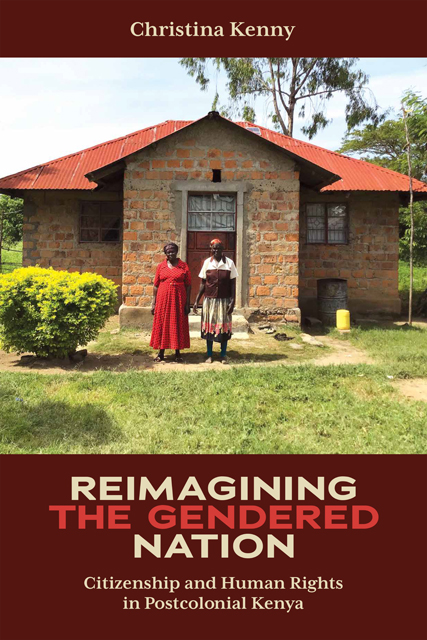Book contents
- Frontmatter
- Dedication
- Contents
- List of Illustrations
- Acknowledgements
- Note on Ethnic Identities
- List of Abbreviations
- Introduction
- 1 The Kenya Colony in British East Africa: A History of Ethno-patriarchy
- 2 Bodies as Battlefields, Bodies as Weapons: The Colonial Regulation of Women’s Bodies
- 3 Myths of Sorority: Kenyan Women’s Community Organisation
- 4 Everyday Violence: Violence against Women during Elections and Times of Peace
- 5 Gendered Citizenship, Politics and Public Space: Women’s Participation in Government
- Conclusion
- Appendix: Field Work, Focus Groups and Interviews
- Bibliography
- Index
- Eastern Africa Series
Introduction
Published online by Cambridge University Press: 17 December 2022
- Frontmatter
- Dedication
- Contents
- List of Illustrations
- Acknowledgements
- Note on Ethnic Identities
- List of Abbreviations
- Introduction
- 1 The Kenya Colony in British East Africa: A History of Ethno-patriarchy
- 2 Bodies as Battlefields, Bodies as Weapons: The Colonial Regulation of Women’s Bodies
- 3 Myths of Sorority: Kenyan Women’s Community Organisation
- 4 Everyday Violence: Violence against Women during Elections and Times of Peace
- 5 Gendered Citizenship, Politics and Public Space: Women’s Participation in Government
- Conclusion
- Appendix: Field Work, Focus Groups and Interviews
- Bibliography
- Index
- Eastern Africa Series
Summary
Our bodies are our first homes. If we are not safe in our bodies, we are always homeless.
In 2014, when I was working in Nairobi at the Kenya Human Rights Commission (KHRC), The Nairobi Law Monthly published an article entitled ‘Female judicial officers fry in their hot temper’. The article went on to explain that ‘science indicates that some women might, due to hormonal activities, be temperamental’, a fact which needed ‘to be accommodated by the vetting board’. In Kenyan public life, women’s bodies always need to be accounted for. The Kenyan public is constantly reminded that the experiential reality of living in a woman’s body is something that would (and even should) often limit one’s career prospects, and the reach of one’s authority. For women in public office, or aspiring to public office, assumptions of the ‘natural’ weaknesses and limitations of womanhood need to be constantly refuted.
Although most women in Kenya are not lawyers, and do not aspire to public office, we know that Kenyan women as a group across the socioeconomic spectrum face serious challenges to their health, wellbeing and access to justice. In 1994, the prominent Kenyan women’s rights advocate and scholar Maria Nzomo lamented the failure of the postcolonial era to provide women with improved access to their human rights. She argued that the twin forces of ‘autocratic African governments’ and ‘underdeveloped economies built upon highly patriarchal societies’ had contributed to generations of women with high rates of illiteracy and ‘extremely low levels of gender, civil and legal rights awareness’. Further, she argued, ‘the trend in the status of women’s human rights in Africa is increasingly one of violation rather than promotion of those rights’. The experiences of Kenyan women have not significantly improved in the intervening years.
Although recent national data sets are difficult to come by, the Kenyan Government’s Second Voluntary National Review on the Implementation of the Sustainable Development Goals offers a collation of the available key statistical markers. The number of people living in absolute poverty has increased over the decade 2009–2019, and maternal mortality is still high. In the reporting period 2009–2014, almost 40 per cent of women and girls fifteen years and older had experienced physical violence from a current or former intimate partner, while almost half of all Kenyan women and girls aged over fifteen years reported experiencing physical, sexual or emotional/psychological abuse in the previous twelve months.
- Type
- Chapter
- Information
- Reimagining the Gendered NationCitizenship and Human Rights in Postcolonial Kenya, pp. 1 - 19Publisher: Boydell & BrewerPrint publication year: 2022



